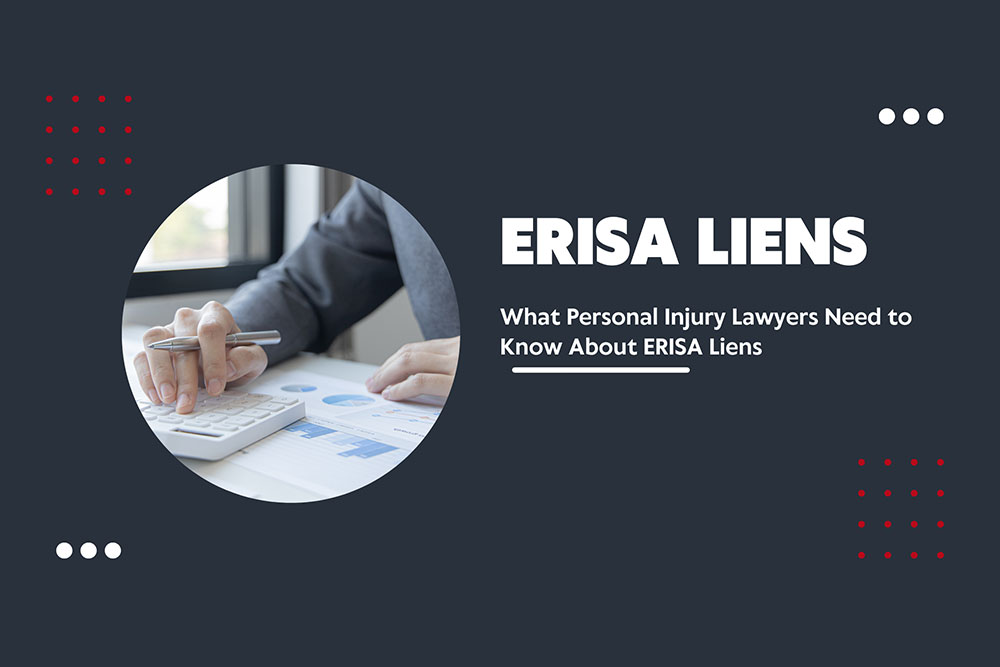Table of Contents
What is an ERISA Lien?
Personal injury lawyers are frequently faced with lien claims against their clients’ recoveries brought by health insurers, union welfare funds, and other health benefit plans. Those plans fall within ERISA’s scope as “welfare plans” which are defined to encompass any plan, fund, or program which was heretofore or is hereafter established or maintained by an employer or by an employee organization, or by both, to the extent that such plan, fund, or program was established or is maintained for the purpose of providing for its participants or their beneficiaries, through the purchase of insurance or otherwise, (A) medical, surgical, or hospital care or benefits, or benefits in the event of sickness, accident, disability, death or unemployment, or vacation benefits, apprenticeship or other training programs, or day care centers, scholarship funds, or prepaid legal services, or (B) any benefit described in section 186(c) of this title (other than pensions on retirement or death, and insurance to provide such pensions).
The breadth of that definition means that as to most employees, their health benefit plans are governed by ERISA irrespective of whether those plans are fully insured or self-funded; and reimbursement and even subrogation provisions are a universal feature of all health benefit plans. However, plans sponsored by federal, state, and local government entities are exempted from ERISA, although those plans also contain reimbursement provisions. Another exemption from ERISA exists for so-called “church plans,” which are plans sponsored by churches or a congregation of churches, although such plans can opt to be governed by ERISA.
Major Cases Related to ERISA Liens
With respect to ERISA liens, the Supreme Court has decided four major cases that addressed recoupment provisions in health benefit plans. The earliest case was Great West v. Knudson, which involved an insurer that was attempting to exercise its reimbursement rights. Most of the court’s discussion was esoteric and involved the question of whether the insurer’s claims were equitable in nature since ERISA allows permits equitable relief. Because the plan was seeking a monetary reimbursement, the Court found its claim was barred since an action seeking money damages is quintessentially legal, not equitable, in nature.
Great West was not the final word on the subject, though. The Supreme Court agreed to hear Sereboff v. Mid Atlantic Medical Services, Inc. a short time later. There, the Court avoided the equitable/legal relief issue by characterizing the recoupment provision in the insurance policy as analogous to an attorney’s lien. Thus, the health insurer was found to have the right to enforce its “lien by agreement” to recoup the payments it had made by attaching a portion of the personal injury recovery.
Next, in U.S. Airways v. McCutchen, the Supreme Court addressed the question of whether there were equitable defenses that could be asserted to challenge a reimbursement claim. Prior to McCutchen, courts were divided on whether the “make whole doctrine” or “common fund doctrine” was available to either defeat the insurer’s claim when the plaintiff’s recovery in the personal injury action was inadequate or could mitigate the plaintiff’s reimbursement obligation by subjecting the insurer to bear its share of attorneys’ fees incurred in the personal injury action. McCutchen ruled that equitable defenses were unavailable; however, if the benefit plan was silent on the issue, the common fund doctrine could be used as a “gap-filler,” although even the common fund doctrine would be inapplicable if the plan at issue explicitly contained language that would disallow its application. Interestingly, following the Supreme Court’s ruling, the district court found on remand that while the plan’s summary plan description allowed the plan to seek reimbursement from an underinsured motorist insurance claim, the plan itself did not, which ended up seriously limiting the amount U.S. Airways could recoup.
Finally, the most recent ruling on this issue is Montanile v. Board of Trustees of the National Elevator Industry Health Benefit Plan, which held that the benefit plan lost its right to seek reimbursement because the plan failed to seek to enforce its reimbursement right until after the personal injury settlement funds were distributed. The plan was on notice of the settlement and pending distribution but failed to promptly act.
What Are the Key Points for Personal Injury Lawyers to Remember?
It is critical for the personal injury lawyer to obtain the benefit plan and not just rely on the summary plan description (SPD). When there is a variance between the plan and the SPD, the plan language typically governs.
It is just as important for personal injury lawyers to attempt to negotiate with the benefit plans as early as possible. As a result of the McCutchen ruling, most plans now explicitly exclude the applicability of the common fund doctrine, which means the benefit plans can receive 100% reimbursement without any reduction whatsoever. However, most plans will still negotiate.
It can be very problematic for a personal injury lawyer to evade trying to resolve reimbursement claims. Any leverage to negotiate a lower reimbursement is lost if the attorney waits too long. Moreover, there have been cases which have found that attorneys engaged in tortious interference with contract when they concealed settlements from health benefit plans after agreeing to recognize reimbursement claims.
Every case is unique, though, and there may be variances in plan language and circumstances that can be beneficial in negotiations. One such example would be that some states have “anti-subrogation” laws that may defeat some reimbursement claims. However, those laws would only benefit claimants who are in fully insured plans. For those in self-funded plans, such laws are preempted by the ERISA statute. Attorneys who represent personal injury victims need to be aware of ERISA liens and how best to deal with lien claims.
29 U.S.C. § 1002(1)
534 U.S. 204 (2002)
547 U.S. 356 (2006)
569 U.S. 88 (2013)
577 U.S. 136 (2019)







